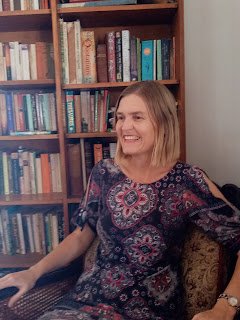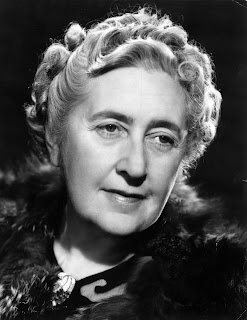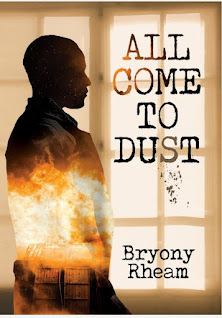Bryony Rheam for Michael - Thursday
 |
| Bryony Rheam |
Bryony Rheam is a
Zimbabwean author who lives with her family in Bulawayo. Her debut novel This September Sun won Best First Book award in Zimbabwe and went
to #1 on Kindle in the UK. Her new book, All
Come to Dust, also an award winner, was chosen as one of ten top African thrillers by Publishers’
Weekly who described it as a “stunning crime debut”. I loved the book, and it
was my pick of mysteries set in Africa for 2021. Paula Hawkins (author of The Girl on the Train) clearly felt the same way, describing the protagonist,
Chief Inspector Edmund Dube, as “a fictional detective as memorable as Hercule
Poirot”.
That would have
made Bryony’s day because of her long association with Agatha Christie’s books.
Here she tells us about that and how it motivated All Come to Dust.
Welcome Bryony to MurderIsEverywhere.
My journey with Agatha Christie began
many years ago with my maternal grandmother. She was a lovely lady: very
clever, well-read and funny. Having left
school at the age of fourteen, she was largely self-taught. She loved to read, and she read anything and
everything, but, in particular, she loved Agatha Christie. On Friday afternoons, I would take her books
to the library for her, and I would exchange one lot of Agatha Christies for
another.
She must have read them all; she must have read them two or three times, but it did not bother her. As an adult, and as an ardent fan of Christie’s myself, I now understand part of this desire to read and reread her novels. My grandmother was brokenhearted - she had lost her son in a car accident when he was twenty-one. She struggled, but she could not overcome severe depression and grief. All reading provides an escape, but with Christie it was so much more.
 |
| Agatha Christie |
Agatha Christie is considered the
"Queen of Crime". Although not alone in
doing so, she is credited with the development of the crime novel into what we
know today and its growth in popularity. She is best known for a "closed murder" story in which the crime can
only have been committed by a limited number of people, each with their own
particular motive for doing so. Everyone
is a suspect and usually it is the least obvious person who "dunnit".
The murders are not gory; there are
no detailed descriptions of prolonged deaths, the pain and injuries inflicted
or the mutilated body. That is not
important. What is, is the method and
the motivation. The planning behind the
murders is always meticulous: the murderer knows who will be where when, how
many minutes he or she has to cross the garden and enter the study window, how
important it is that the poison is administered with the bedtime cocoa and not
the after-dinner coffee, or how the drinks on the tray must be arranged just so
in order that the victim chooses the correct one.
Of course, they make other errors
which eventually lead to their downfall. Yet it is this absolute attention to detail that I believe makes
Christie novels so intriguing. It’s the
puzzle that’s important and puzzles can eventually be solved. All the pieces are there; the reader just has
to put them together correctly – which of course we rarely, if ever, do – and
that’s exactly where Christie’s genius lies.
Despite her upper-middle class
background, Agatha Christie always felt like something of an outsider, which
likely accounts for two of her most famous detectives, Hercule Poirot and Miss
Marple, being on the margins of society: Poirot is a foreigner and Marple is
elderly. As such, they are able to bring
attention to both the idiosyncrasies and the shortcomings of English society.
But there is another way in which
Christie undermines the very essence of Englishness, and, in doing so, also undercuts
the stereotypes associated with it. Her
books capture that beautiful feel of an orderly life: the clock ticking in the
drawing room, the letters on the breakfast tray, the train arriving at exactly
three minutes past four. Her characters
who lead such orderly lives are well-spoken, polite and know which spoon is for
the soup and which for the dessert. The undermining of all this is what
unsettles us so much. How could the
vicar’s wife devise a murder so clever and with such calculation that it takes
the powers of a super sleuth to detect the flaws? How could the murderer have
written such hateful letters in the beautiful library; how could they have
thought of putting poison in the tea served so punctually at four o’clock on
the terrace?
It unsettles us. Christie takes us into the dark areas of the
places we consider safe. More than that, the very things that add to that
lovely slow rhythm of conventionally English life - trains that run on time,
tea at four o’clock, an efficient postal system - seem to have been used
against us. If these things, these
people, these places are unsafe, then where is not? We would feel less
vulnerable on the streets of New York or in the ganglands of Glasgow. As readers, we feel we have got into the car
of the stranger our parents always warned us about. But they were smiling, they were welcoming,
they had double-barrelled surnames we say – and so we seal our doom.
The good thing, of course, is that she rescues us. The detective arrives, the plot is worked out and the murderer is caught. Except perhaps for Murder on the Orient Express, everything is sorted out and any loose ends are firmly tied up. The puzzle is solved and the dark places dissolve. Once again, the calm ticking of the clock is restored. That is what I find so satisfying and that is what appealed so much to my grandmother. She had come to fear life. Her experience told her that anything can be taken from you at any time, even people you love with your entire self. Being a good person, living a good life – what did it mean? It was no guarantee that you wouldn’t be dealt a terrible hand. But if the dark places were not made light in her own life, at least they were in fiction.
 |
| Outside Agatha Christie's house in Greenway |
Yet it was to be another six years before this became a reality. All Come To Dust was published in Zimbabwe in November 2020, the UK in September 2021, and in the US this month. When I sat down to write it, I wanted to follow the structure of a classic Christie novel. However, there were some very obvious differences that I had to negotiate: present day Bulawayo is very different to the England that Christie wrote of from the 1920s to the 1970s. A closed murder seemed unlikely; in fact, it felt claustrophobic. The more I thought and planned, the more that it became apparent that many of the conventional tropes of the western crime novel would not work.
Zimbabwe’s police force is riddled
with corruption. It is also generally
quite inefficient and there would certainly be very little forensic investigation
into a death. However, I still decided
to use a policeman to investigate the murder. He is also an outsider, a man who
wants to do good in a world that seems overwhelmingly corrupt. He spends his time typing up traffic
offences, trying to put the world to rights through the meticulous recording of
events that will probably be settled by the payment of a bribe to someone on
the force.
The lack of forensic investigation
was a bonus for me as I, like Agatha Christie, could concentrate on the puzzle
and not get weighed down by having to bring in technical detail. Nor did I go
into any great description of the murder itself for I do not feel the need to
do so. This is probably one of the reasons why reviewers often describe All
Come To Dust as ‘an old-fashioned’ murder.
Yet this would suggest a ‘happy ending’ and, while it is true, that the mystery itself is solved, there is also a strong sense that any form of justice in Zimbabwe is not administered in the conventional way. The sense of restored order evident at the end of an Agatha Christie novel is also not present. The peace is hesitant, wary, aware always that it is under threat.
 |
| Modern day Bulawayo |
I might not have set out to
undermine the archetypal crime novel, but it became increasingly clear that the
structure did not sit well in an African setting. It seemed obvious therefore to try and highlight
this disconnect rather than ignore it. In doing so, I was able to explore
modern Zimbabwean society through an eclectic range of characters, each bound
in some way to the past and fearful of the future.
When I finished writing All Come
To Dust, I decided that I would not write another crime novel. I had set myself a challenge and I had
completed it. But now I see crime
writing offers so many opportunities to explore the inconsistencies evident in
Zimbabwean life. And so it is that the
quest to follow Agatha Christie’s journey has led me to a journey of my
own. I can only be excited of what lies
ahead.


















Wonderfully insightful column, Bryony! I look forward to reading your book.
ReplyDeleteThank you! I hope you enjoy it.
DeleteI, too, can only be excited for what lies ahead for you, Bryony. Agatha Christie would be proud! Well done.
ReplyDeleteThank you!
DeleteNow for the big question! What's your expert take on Kenneth Branagh's take on Murder On The Orient Express and Death On The Nile?
ReplyDeleteOh dear - sorry, I really don't like him as Poirot. David Suchet became Poirot when he played him. He captured all his mannerisms and his personality. I don't feel Kenneth Branagh has even read the books.
DeleteI've persuaded Bryony to join us for a presentation on Christie's time in southern Africa at this year's International Agatha Christie Festival. Looking forward to that!
ReplyDeleteSo am I, Michael!
ReplyDeleteWill be very interesting - a date not to be missed.
Delete